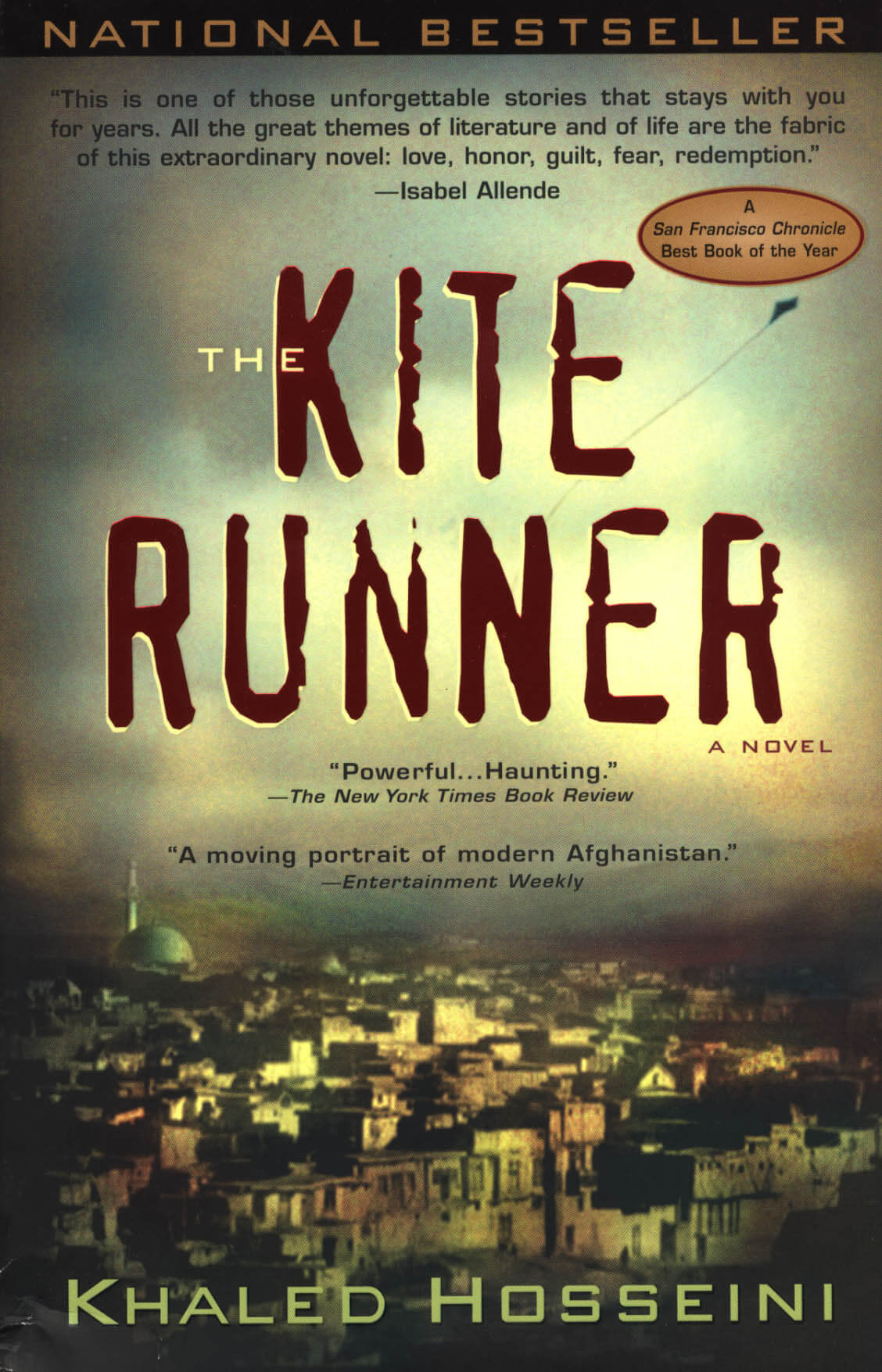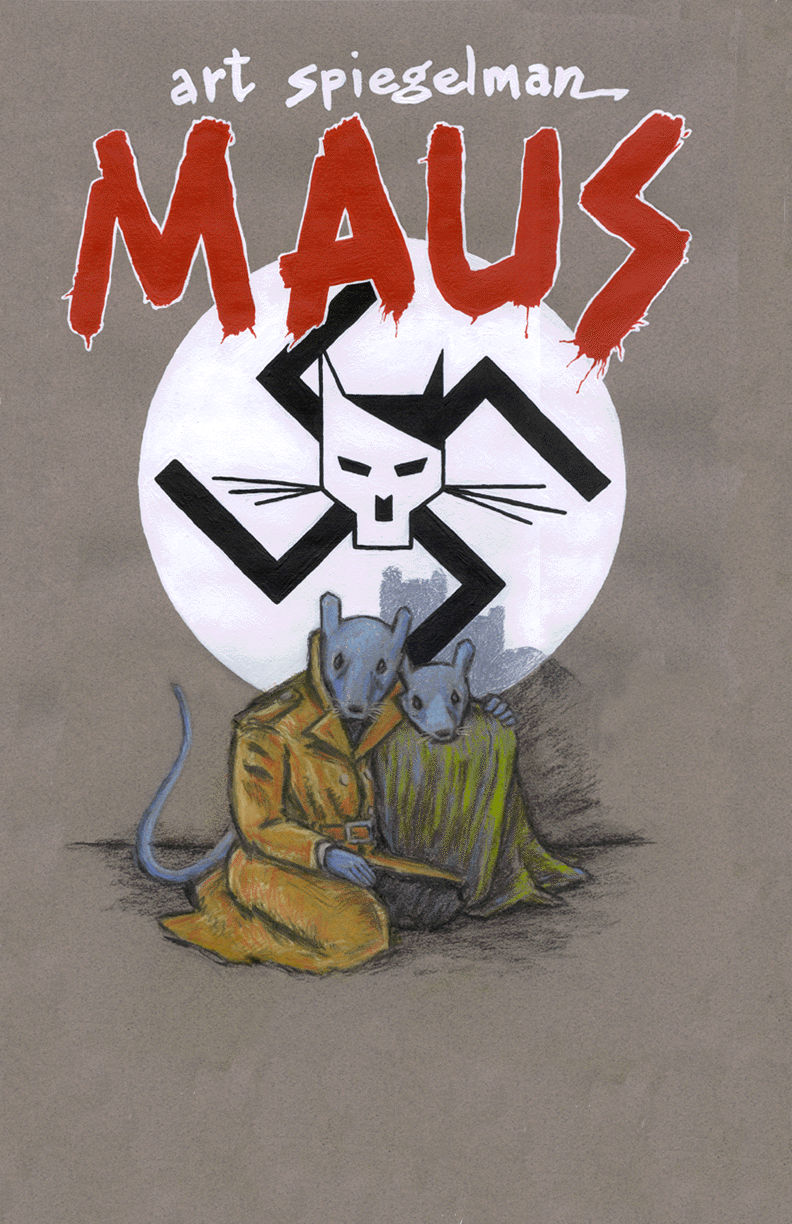The Kite Runner vs. Maus
 The Kite Runner, a fictional account of the lives of two Afghani boys, by Khaled Hosseini left a bad taste in mouth. It is a dark book, sometimes unnerving, but there is more to it. I hated the narrator; I hated how he wallowed in every little bit of misery that he could find, how he milked his background for every tiny bit of sellable ethnic exotica. I felt the narrator, who is also a writer (if not THE writer; the book reads like a memoir but is not one) was selling his past and his people. The Kite Runner is a well-written piece of literature that I wanted to rid myself of upon finishing.
The Kite Runner, a fictional account of the lives of two Afghani boys, by Khaled Hosseini left a bad taste in mouth. It is a dark book, sometimes unnerving, but there is more to it. I hated the narrator; I hated how he wallowed in every little bit of misery that he could find, how he milked his background for every tiny bit of sellable ethnic exotica. I felt the narrator, who is also a writer (if not THE writer; the book reads like a memoir but is not one) was selling his past and his people. The Kite Runner is a well-written piece of literature that I wanted to rid myself of upon finishing.
Without a break from literary gloom, I went straight for Art Spiegelman’s Maus. As I’ve mentioned before, comic books haven’t been comic in some time, and this story of the Holocaust as told by a father to a son, was no exception. Initially, I had the same feeling. I thought to myself, what a fuckhead this Spiegelman is (in this case, the narrator is a writer and in fact, THE writer). He is hungry for this sellable story that he is almost battering his ailing father, Vladek, for. But then an amazing thing happened, Arty the mouse–the Jews in the story are mice, the Germas are cats, the Poles are pigs, the Americans are dogs, and so on–was talking to his wife about how much of a fuckhead he is. Ah! He KNOWS. He is aware! In fact, the whole book is hyperaware of itself. The reader is brought along for Vladek’s story of his survival, and for Arty’s story of getting the story, as well as how he struggled for a decade to finally get himself together enough to put together this book, this book you are reading.
The Kite Runner is a page turner. It starts out strong with a story of a childhood two boys, Amir and Hassan, spent together. They were inseparable despite the class difference between them. Amir was the son of a rich pashtun businessman, while Hassan’s father was only their crippled Hazara servant. The book is written from Amir’s point of view and he tells of Hassan’s intelligence, natural athletic ability and nearly angelic disposition while portraying himself as weak, oblivious, and jealous. Hassan is loved by Baba, Amir’s father, the way that Amir finds that he is not. And so, in return for Hassan’s love and endless loyalty Amir can only give cruelty, betrayal, and then equally endless guilt.
After a third of the book is finished, the story becomes the generic incarnation of other immigrant stories, the hard work, the squalid living conditions and the culture shock. Also the snippets of a culture left behind now thriving in America at flea markets and family get-togethers. The final portion of the book is a story of penance and forgiveness, and although still a page turner, it is fairly obvious how everything will turn out. In fact, throughout the book, the story was not exactly boring, but even minute attempts at foreshadowing instead exposed the plot.
The story of Amir and his realtionship with Hassan as well as Baba takes place in the context of political upheaval, ethnic cleansing, and immigration to America. Meanwhile the extremely human characters marry, become ill, lose friends and relatives, give birth to children. These characters are what lends the book its page-turner status, you care and want to know what happens to them. But the most redeeming quality of the book is its use of literary device. If taken as metaphor, as a dichotomy within a human being, as something of a Jekyll and Hyde tale, it is very interesting. At face value, it is another piece of suffering sold to eager crowds.
 The Kite Runner has become a motion picture, and from what I hear, a good one. Art Spiegelman’s Maus remains a black and white comic book. In Part II of Maus titled “And Here My Troubles Began” there is a series of panels of the writer, wearing a mouse mask, sitting at his desk surrounded by corpses. People come at him from every side, oblivious to the corpses, with cameras, microphones, contracts. He is bewildered, and distraught, shrinking, becoming a small child. When they all leave him, “Whew. They’re gone. Sometimes I just don’t feel like a functioning adult.” Then he too leaves, also walking on the flyblown starved corpses strewn around him.
The Kite Runner has become a motion picture, and from what I hear, a good one. Art Spiegelman’s Maus remains a black and white comic book. In Part II of Maus titled “And Here My Troubles Began” there is a series of panels of the writer, wearing a mouse mask, sitting at his desk surrounded by corpses. People come at him from every side, oblivious to the corpses, with cameras, microphones, contracts. He is bewildered, and distraught, shrinking, becoming a small child. When they all leave him, “Whew. They’re gone. Sometimes I just don’t feel like a functioning adult.” Then he too leaves, also walking on the flyblown starved corpses strewn around him.
I think this is the portion of the book that best expresses how I feel about these stories. These panels reveal what it is like to write something this appealing, that will attract audience through either curiosity or guilt or the human fascination with suffering, but what it is also like to reject further capitalization on history of murder.
I have always been bothered by stories told about the suffering of a people, or even the suffering of one child. I don’t mean to say I don’t read them, but I am always slightly annoyed. I believe that the world needs to be aware of the wrongs that are going on, especially right now, especially in the Middle East. We shouldn’t think of the people there as a “them” against an “us,” ignorant of their history except for the parts that have affected us, and this is where The Kite Runner becomes valuable because it is educational. It is sad, I suppose, that the only way we can learn anything is if it is put in a format of entertainment. Movies and books is how we learn of revolutions and deaths of thousands and how little by little atrocities come to be mundane. But I am always unnerved that each of these writers becomes a success leeching from the misery of his people. With books like A Child Called It by Dave Pelzer, the writer is at least using his own life, his own story (though it involves many other people whose sides we don’t know anything about). But second-hand accounts (even of fictional characters going through what real persons may have gone through) disturb me.
Spiegelman’s book sheds light on all the questions I have had about such stories. How do you come by them? If it didn’t happen to you, how do you ask your friends and relatives to give of themselves, just to then betray the privacy of their suffering and give it over for the amusement of the general public. Arty the mouse only begins to visit his dad when he gets it in his head to draw a comic about the Holocaust, he only learns about his past by basically telling his dad to shut up about his current troubles already and to just tell the damn story, because he needs it, for his book. He worries that his father is in actuality “a racist caricature” of a Jew, but feels it is right to stick to the truth. And he portrays his own character just as mercilessly. As the story goes on, Arty asks his father all the questions that I would have wanted to ask, “why did no one stand up to the Germans?” How could people jump down into mass graves and stay there just to be covered in gasoline and burn? And he gets simple honest answers.
Spiegelman used animals to tell his story, to allow for a remove, but at the same time, taking the reader almost off guard by telling the story just as his father must have told it to him. Somehow, it is easier to relate to the characters when they are mice or pigs, than if they were people. We are already aware of the Holocaust, desensitized to it, we don’t let it near our hearts or our minds because it is too horrible. But this book touches the reader through phrases like “And I saw, it’s not EVERYWHERE, my hell. It’s still LIFE things going on” from Vladek’s mouth as he was marched to Dachau at the end of the war, watching people spared from the purge still living their lives.
Where The Kite Runner wallows, Maus explains in sober tones. Where The Kite Runner waxes poetic, Maus has unrelenting dialogue between an annoyed son and an overly anxious frugal father. Where The Kite Runner finds forgiveness, Maus finished the story just as it was told to Arty by his father who was already having trouble separating the past from the present and who tired of reliving his demons. It may be an unfair comparison, but the stark contrast between methods of presentation of difficult history, both very effective, but one so much more honest was really brought home to me through the reading of these two works. I hope that you too pick up both books and consider what you learn from them and how.
Amazon.com links:
I’m always looking for ideas. Now I have two. Thank you.
Rob! I can’t believe you managed to check the zine! I’ll mail u Kite Runner when my friend finishes it, I don’t own Maus tho. I sent you a letter, btw, you should get it in your neck of the desert in about a month.
You rock!